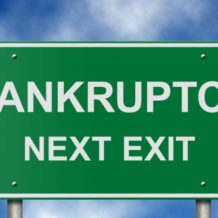Thinking of Filing for Bankruptcy?

So, your situation has reached critical mass and you need to file for personal bankruptcy. What are your options? Generally speaking, your bankruptcy options are either Chapter 7 or Chapter13. What is the difference and which one is right for you? That depends on your financial situation. This article will discuss the main differences between Chapter 7 and 13 bankruptcies, and which one is best for a particular situation.
CHAPTER 7
The key features of a Chapter 7 bankruptcy are as follows:
• It will discharge most types of unsecured debt.
• The trustee sells any significant nonexempt property to repay creditors.
• It takes three to four months to complete.
• You keep most personal property. (You will likely lose your home, if you own one.)
• To qualify, you must have income less than the median of your state, or pass a “means” test.
To qualify for Chapter 7 bankruptcy, you must have little or no disposable income. If you make too much money, you may be required to file a Chapter 13 bankruptcy (discussed below). When you file for Chapter 7 bankruptcy, a trustee is appointed to administer your case. In addition to reviewing your bankruptcy papers and supporting documents, the Chapter 7 trustee’s job is to sell your nonexempt property to pay back your creditors. If you don’t have any nonexempt assets, your creditors receive nothing. In Chapter 7, it is less likely that a debtor can keep their home if they are behind on their mortgage payments. The court will usually grant a lender’s request to lift an automatic stay in order to continue foreclosure proceedings on the home.
Reasons to File for Chapter 7
Chapter 7 bankruptcy is appropriate under the following circumstances:
• You are unable to repay debt in a repayment plan.
• You need quick relief from creditors. (It takes as little as three months for a bankruptcy court to issue a discharge order.) After discharge, the debtor no longer has personal liability for the discharged debt.
•You want to get rid of your dischargeable debt. Most Chapter 7 debt is dischargeable. Dischargeable debt includes credit card debt, medical bills, and personal loans.
CHAPTER 13
The key features of a Chapter 13 bankruptcy are as follows:
• You repay your creditors (in whole or part) through a repayment plan.
• It lasts three to five years.
• None of your property is liquidated. Past due mortgage can be paid through a repayment plan.
• You must make regular monthly payments to trustee.
• Your unsecured debt must be less than $394,725.
Chapter 13 is a bankruptcy designed for debtors with regular income who can pay back at least a portion of their debts through a repayment plan. However, many debtors choose to file for Chapter 13 bankruptcy because it offers many benefits that Chapter 7 bankruptcy does not (such as the ability to catch up on missed mortgage payments or strip wholly unsecured junior liens from your home). In Chapter 13 bankruptcy, you get to keep all of your property (including nonexempt assets). In exchange, you pay back all or a portion of your debts through a repayment plan (the amount you must pay back depends on your income, expenses, and types of debt).
Reasons to File for Chapter 13
Chapter 13 bankruptcy is appropriate under the following circumstances:
• You do not qualify for Chapter 7. A debtor must qualify under the “means test” to file forChapter 7. If the debtor’s income exceeds the median income in their state and they have disposable income to repay some portion of unsecured debt in a Chapter 13 repayment plan, then the debtor does not qualify for Chapter 7.
• You want to repay your debt. In Chapter 13, the debtor will make monthly payments in a three or five year plan to the bankruptcy trustee for the distribution to creditors. The debtor must have enough disposable income to pay all priority and secured debt in full and to pay unsecured creditors in an amount at least equal to the value of the debtor’s nonexempt property.
• You want to save your home from foreclosure. Filing for Chapter 13 may permanently stop a foreclosure. An automatic stay will temporarily prevent a foreclosure until the court confirms the debtor’s repayment plan. Once confirmed, the debtor will pay back the missed payments over the life of the plan and the terms and conditions of the original agreement will govern the debtor and the lender’s relationship.
• You want to stop the repossession of your car. A debtor can stop the repossession of a car by filing for Chapter 13 and by repaying the debt and the arrearage in the plan.
• You want to keep nonexempt property.
ABOUT LINDA LINDSEY
Linda A. Lindsey is a life-long resident of the Inland Empire and she is the sole proprietor of Lindsey Law. She is not only a licensed attorney in the State of California and the United States – Central District Court of California; she also holds an M.B.A. and has over 25 years of successful for-profit and non-profit business experience. She believes that all persons should have access to justice and even with a busy law practice she contributes her time and energy at local legal aid agencies. Ms. Lindsey provides legal representation in the areas of family law, bankruptcy and contracts. Lindsey Law is dedicated to providing its clients with quality legal representation from inception to conclusion. To learn more about Ms. Lindsey and Lindsey Law, please visit http://lindseylawoffice.net





